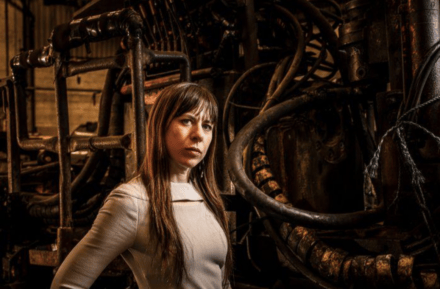“Ms. Mazzoli, early in her career, played electronic keyboards in Victoire, an ensemble that combined rock and classical instrumentation and played music that seemed to be both and neither. More recently, she has focused on symphonic works and opera; her sixth, “Lincoln in the Bardo,” based on the George Saunders novel, will be staged at the English National Opera in 2025 and at the Met in 2026. The Swedish Bis label has now released “Dark With Excessive
Bright,” a collection of her recent works.
The title work, originally a 2018 double bass concerto, is presented here in arrangements—as a violin concerto and in a version for violin and string quintet, both completed in 2021 for the violinist Peter Herresthal, who plays them here. Ms. Mazzoli’s disinclination to embrace a specific school of thought about tonality or style, and her imaginative approach to orchestration, have allowed her to create idiosyncratic sound worlds. In “Dark With Excessive Bright” (which takes its title
from Milton’s description of God’s robes in “Paradise Lost”) the solo violin line moves between modal and chromatic passages, preening Romanticism and timbral effects, all shining through a dark, moody ensemble fabric. Mr. Herresthal brings an expressive heft and a richly varied tone in both versions. The chamber edition, which he plays with members of Arctic Philharmonic (Tim Weiss conducting) has an appealing compactness, but it does not match the grandeur of the orchestral account by the Bergen Philharmonic Orchestra (led by James Gaffigan).
Mr. Weiss and his Arctic players convey the sense of serene mystery that drives Ms. Mazzoli’s meditative “Sinfonia (for Orbiting Spheres)” (2013), and the dark intensity of her glissando-heavy “These Worlds in Us” (2006). Even more striking is their performance of the two-movement “Orpheus Undone” (2021), a prismatic, episodic score that ranges from moments of anxious chaos to passages in which Ms. Mazzoli channels the lushness of English pastoralism, all in the service of
portraying Orpheus at the moment Eurydice is reclaimed by Hades.
But the album’s almost hidden highlight is “Vespers for Violin” (2014), a six- minute work tucked between orchestral scores. Here, Mr. Herresthal’s sweet-toned rendering of a soaring violin line, steeped in high Romanticism, is couched in a
fabric of tactile electronic sounds. It could be that composers are embracing stylistic fluidity as a way to capture an
otherworldly spirit that is beyond the reach of more dogmatic approaches. Or maybe it’s a form of rebellion, an ornery disinclination to commit to the language of a single era, even their own. Either way, their approach is yielding works of
intensity, beauty and power.”
